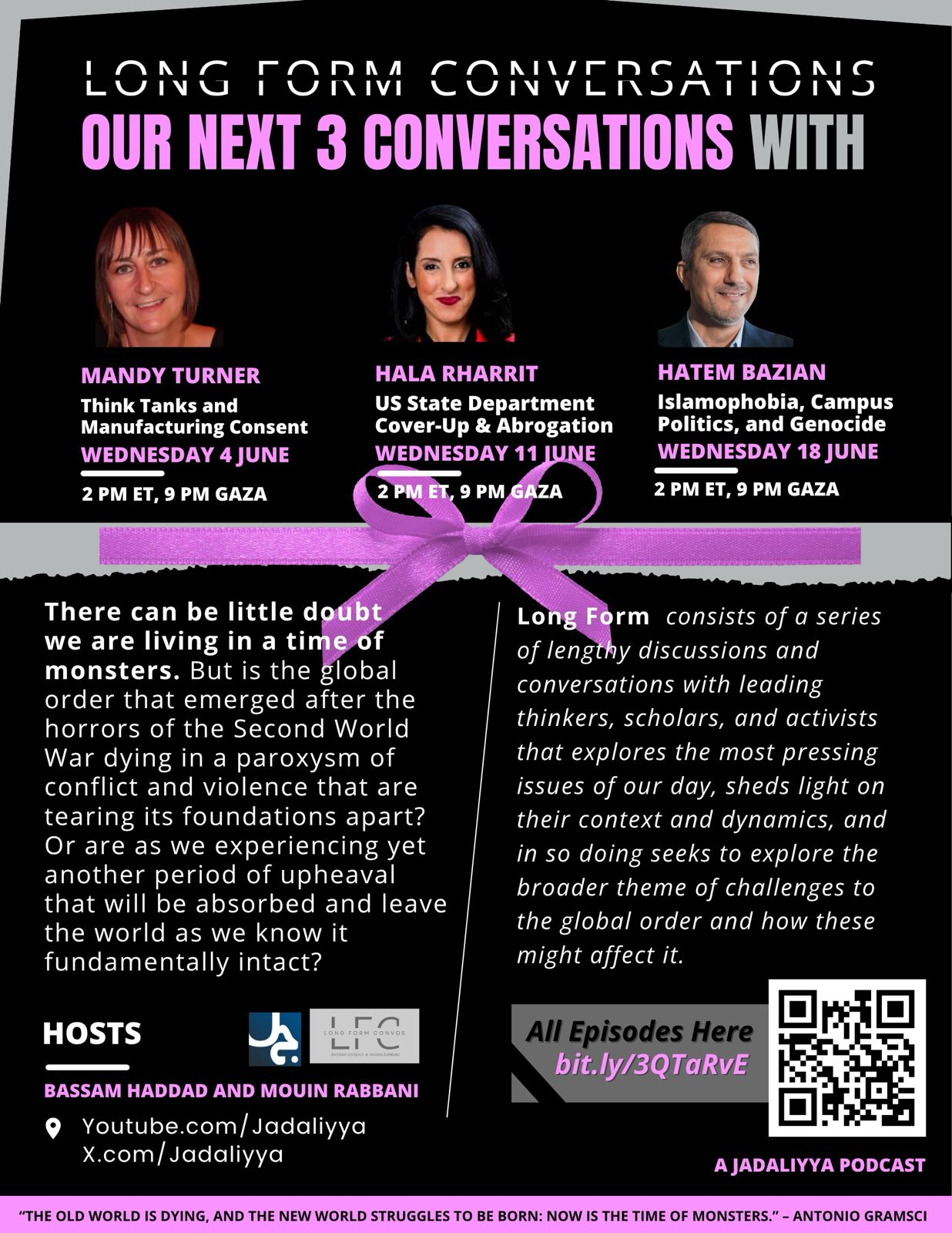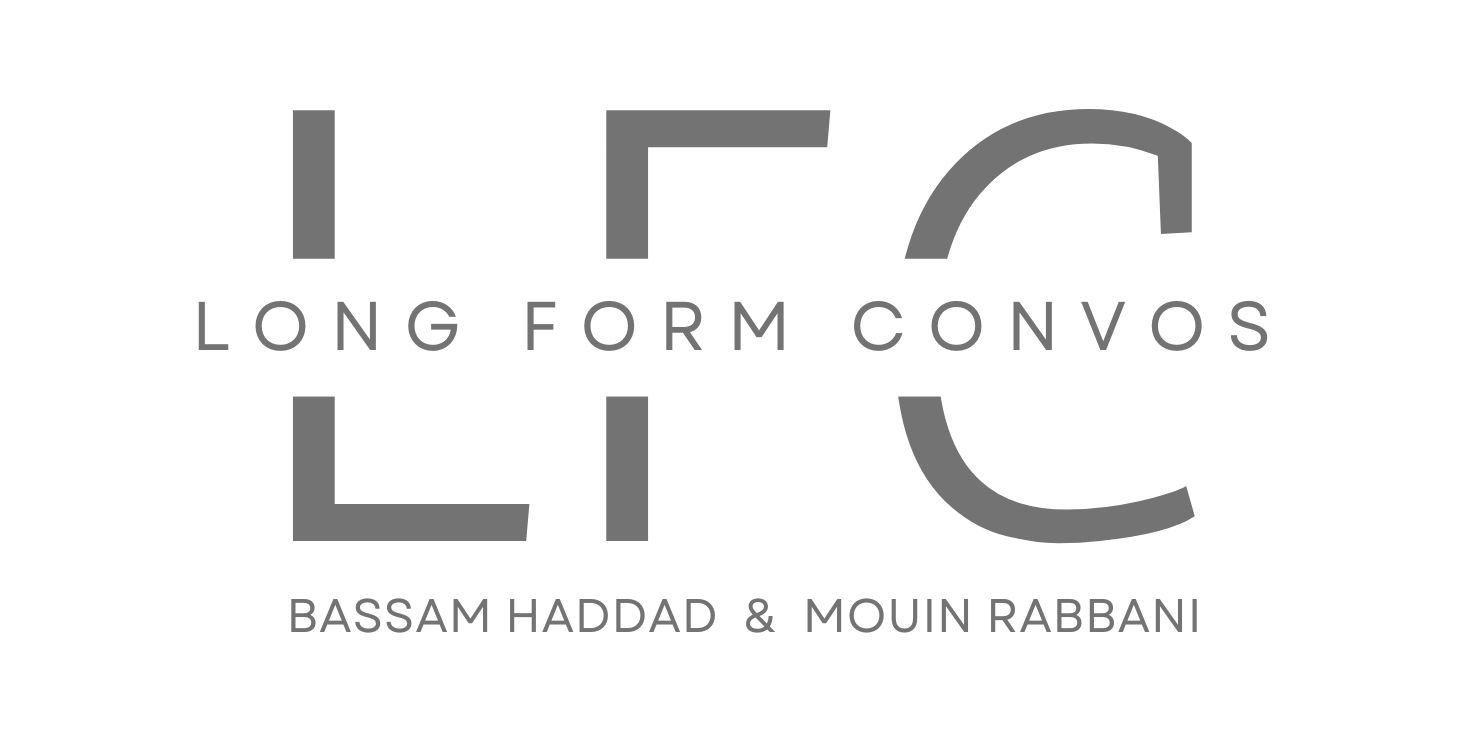Long Form Podcast
(Episodes 7, 8, & 9)
Upcoming Guests:
Mandy Turner
Hala Rharrit
Hatem Bazian
Hosts:
Mouin Rabbani
Bassam Haddad
Watch Here:
Youtube.com/Jadaliyya
X.com/Jadaliyya
There can be little doubt we are living in a time of monsters. But is the global order that emerged after the horrors of the Second World War dying in a paroxysm of conflict and violence that are tearing its foundations apart? Or are we experiencing yet another period of upheaval that will be absorbed and leave the world as we know it fundamentally intact?
Long Form consists of a series of lengthy discussions and conversations with leading thinkers, scholars, and activists that explores the most pressing issues of our day, sheds light on their context and dynamics, and in so doing seeks to explore the broader theme of challenges to the global order and how these might affect it.

Featuring
Mandy Turner (Guest) is an independent writer affiliated with Security in Context as a senior researcher. Her research focuses on the political economy of conflict and peace, humanitarianism and multilateralism, and the situation in Israel and Palestine. She has 30 years’ experience of these issues and has pursued research, writing, and consultancy work through a variety of sectors. Her most recent book is an edited collection called From the River to the Sea: Palestine and Israel in the Shadow of ‘Peace’ (Rowman and Littlefi eld, 2019), which was also published in Arabic by the Arab Center for Research and Policy Studies (Doha) in 2024.
Hala Rharrit (Guest) is an expert in Middle East and North African (MENA) affairs and U.S. relations with the MENA region. She is a political commentator and author, frequently appearing on international media. Hala was an award-winning American diplomat who resigned from the State Department in April 2024 in opposition to the Biden's Administration Gaza policy. Hala is fundamentally a peacemaker and her resignation made her the first career American diplomat to publicly resign. She has been one of the most vocal officials critical of the U.S. policy in Gaza and in her many interviews since leaving the State Department, including with 60 Minutes, CNN, Washington Post, NPR, Democracy Now, and Al Jazeera English, she explains how the policy is illegal, inhumane, counter-productive, and a threat to U.S. national security.
Hala joined the Foreign Service in 2006 as a political officer. Some of her tours include Political and Human Rights Officer at the U.S. Embassy in Sanaa, Yemen, Deputy Chief of the Political/Economic Section at the U.S. Embassy in Doha, Qatar, and Political/Economic Chief at the U.S. Consulate in Durban, South Africa. In her most recent role, she was the face of the U.S. government as Spokesperson for the State Department to the MENA region, based at the Regional Media Hub at the U.S. Consulate in Dubai, UAE.
Hatem Bazian (Guest) is a Decolonial Islamic scholar that centers Islam's epistemology in all his work and examines the contemporary world through a global south lens. Dr. Bazian is Known as organic intellectual, a term used for scholars who directly connect their work and scholarship to people and not confined to academia's constructed walls of separation. Dr. Bazian is an author of five books, numerous chapters, peer-reviewed journal articles, hundreds of press articles, and constant academic contributions and engagement across the globe. Dr. Bazian is a leading scholar in the Islamophobia Studies field having founded the Islamophobia Studies Center, Editor-in-Chief of the Islamophobia Studies Journal and co-founder and current President of the International Islamophobia Studies and Research Association (IISRA).
Bazian co-founded Zaytuna College, the 1st Accredited Muslim Liberal Arts College in the United States. Dr. Bazian is a lecturer in the Departments of Middle East Languages and Cultures and Asian Diaspora Studies at the University of California, Berkeley. Dr. Bazian between 2002-2007, also served as an adjunct professor of law at Boalt Hall School of Law at the University of California, Berkeley. In addition to Berkeley, Prof. Bazian served as a visiting Professor in Religious Studies at Saint Mary’s College of California 2001-2007 and adviser to the Religion, Politics and Globalization Center at UC Berkeley. At the community level, Dr. Bazian is the President of the Northern California Islamic Council, co-founder of American Muslims for Palestine, and Board Member of the Muslim Legal Fund for America.
Mouin Rabbani (Host) is a researcher, analyst, and commentator specialising in Palestinian affairs, the Arab-Israeli conflict, and the contemporary Middle East. He has among other positions previously served as Principal Political Affairs Officer with the Office of the UN Special Envoy for Syria, Head of Middle East with the Martti Ahtisaari Peace Foundation, and Senior Middle East Analyst and Special Advisor on Israel-Palestine with the International Crisis Group. Rabbani is Co-Editor of Jadaliyya, where he also hosts the Connections podcast and edits its Quick Thoughts feature, Managing Editor and Associate Editor of the Journal of Peacebuilding and Development, and a Contributing Editor of Middle East Report. He is Non-Resident Fellow at the Center for Conflict and Humanitarian Studies (CHS) and at Democracy for the Arab World Now (DAWN). A graduate of Tufts University and Georgetown University’s Center for Contemporary Arab Studies (CCAS), Rabbani has published, presented and commented widely on Middle East issues, including for most major print, television and digital media. "
Bassam Haddad (Host) is Founding Director of the Middle East and Islamic Studies Program and Associate Professor at the Schar School of Policy and Government at George Mason University. He is the author of Business Networks in Syria: The Political Economy of Authoritarian Resilience (Stanford University Press, 2011) and co-editor of A Critical Political Economy of the Middle East (Stanford University Press, 2021). Bassam is Co-Founder/Editor of Jadaliyya Ezine and Executive Director of the Arab Studies Institute. He serves as Founding Editor of the Arab Studies Journal and the Knowledge Production Project. He is co-producer/director of the award-winning documentary film, About Baghdad, and director of the acclaimed series Arabs and Terrorism. Bassam is Executive Producer of Status Podcast Channel and Director of the Middle East Studies Pedagogy Initiative (MESPI). He received MESA's Jere L. Bacharach Service Award in 2017 for his service to the profession. Currently, Bassam is working on his second Syria book titled Understanding The Syrian Tragedy: Regime, Opposition, Outsiders (forthcoming, Stanford University Press).
Gaza in Context Collaborative Project
Co-Organizers: Arab Studies Institute, Georgetown University’s Center for Contemporary Arab Studies, George Mason University’s Middle East and Islamic Studies Program, Rutgers Center for Middle Eastern Studies, Birzeit University Museum, Harvard’s Center for Middle Eastern Studies, Brown University’s Center for Middle East Studies, University of Chicago’s Center for Contemporary Theory, Brown University’s New Directions in Palestinian Studies, Georgetown University’s Center for Muslim-Christian Understanding, Simon Fraser University’s Centre for Comparative Muslim Studies, Georgetown University-Qatar, American University of Cairo’s Alternative Policy Studies, Middle East Studies Association’s Global Academy, University of Chicago’s Center for Middle Eastern Studies, CUNY’s Middle East and Middle Eastern American Center, University of Illinois Chicago’s Arab american cultural Center, George Mason University’s AbuSulayman’s Center for Global Islamic Studies, University of Illinois Chicago’s Critical Middle East Studies Working Group, George Washington University’s Institute for Middle East Studies, Columbia University’s Center for Palestine Studies, New York University’s Hagop Kevorkian Center for Near Eastern Studies
“The old world is dying, and the new world struggles to be born: now is the time of monsters.” – Antonio Gramsci


\\ LONG FORM CONVERSATIONS //
There can be little doubt we are living in a time of monsters. But is the global order that emerged after the horrors of the Second World War dying in a paroxysm of conflict and violence that are tearing its foundations apart? Or are as we experiencing yet another period of upheaval that will be absorbed and leave the world as we know it fundamentally intact?
Long Form consists of a series of lengthy discussions and conversations with leading thinkers, scholars, and activists that explores the most pressing issues of our day, sheds light on their context and dynamics, and in so doing seeks to explore the broader theme of challenges to the global order and how these might affect it.